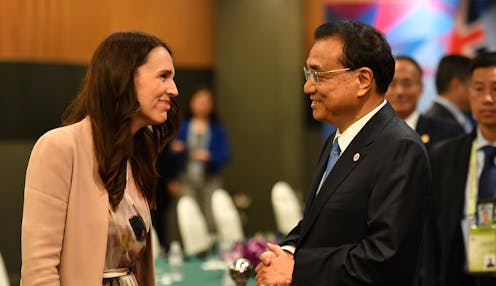Huawei or the highway? The rising costs of New Zealand's relationship with China
- Written by David Belgrave, Lecturer in Politics and Citizenship, Massey University

Until recently, New Zealand’s relationship with China has been easy and at little cost to Wellington. But those days are probably over. New Zealand’s decision to block Huawei from its 5G cellular networks due to security concerns is the first in what could be many hard choices New Zealand will need to make that challenge Wellington’s relationship with Beijing.
For over a decade New Zealand has reaped the benefits of a free-trade agreement with China and seen a boom of Chinese tourists. China is New Zealand’s largest export destination and, apart from concerns about the influence of Chinese capital on the housing market, there have been few negatives for New Zealand.
Long-held fears that New Zealand would eventually have to “choose” between Chinese economic opportunities and American military security had not eventuated.
Read more: New Zealand's Pacific reset: strategic anxieties about rising China
But now New Zealand business people in China have warned of souring relations and the tourism industry is worried about a downturn due to backlash following the Huawei controversy.
China’s growing might
During Labour’s government under Helen Clark (1999-2008) and under the National government with John Key as prime minister (2008-2016), New Zealand could be all things to all people, building closer relationships with China while finally calming the last of the lingering American resentment over New Zealand’s anti-nuclear policies. But now, there are difficult decisions to be made.
As China becomes more assertive on the world stage, it is becoming increasingly difficult for New Zealand to keep up this balancing act. Two forces are pushing a more demanding line from Beijing. One is China’s move to assert more control over waters well off its coast.
For decades, Beijing was happy to let the US Navy maintain order over the Western Pacific to facilitate global trade with China. As China’s own economic and military abilities have grown, it has begun to show that it is willing to protect what it sees as its own patch. Its mammoth island building in the South China Sea is a testament to its new-found desire to push its territorial claims after decades of patience.
Read more: Despite strong words, the US has few options left to reverse China's gains in the South China Sea
China’s stronger foreign policy is testing what is known as the “rules-based order”, essentially a set of agreed rules that facilitate diplomacy, global trade, and resolve disputes between nations. This is very concerning for New Zealand as it needs stable rules to allow it to trade with the world. New Zealand doesn’t have the size to bully other countries into getting what we want.
Trump-style posturing would get New Zealand nowhere. A more powerful China doesn’t need to threaten the rules-based system, but the transition could create uncertainty for business and higher risks of trade disruption. It is vital for New Zealand that an Asia-Pacific dominated by China is as orderly as one dominated by the US.
Tech made in China
The other force challenging the relationship is China’s emergence as a source of technology rather than simply a manufacturer of other countries’ goods. Many Chinese firms like Huawei are now direct competitors of Western tech companies. Huawei’s success makes it strategically important for Beijing and a point of pride for ordinary Chinese citizens.
Yet, unlike Western countries, China actively monitors its population through a wide variety of mass surveillance technology. Therefore, there is a trust problem when Chinese firms claim that their devices are secure from Beijing’s spies. New Zealand’s decision to effectively ban Huawei components from 5G cellular networks could be the first in many decisions needed to ensure national security.
Chinese designed goods are becoming more common and issues around privacy and national security will get stronger as everyday household goods become connected to the internet. Restrictions on Chinese-made goods will further frustrate Beijing and will invite greater retaliation to New Zealand exporters and tourist operators.
In more extreme cases, foreign nationals have been detained in China in response to overseas arrests of prominent Chinese individuals. As many as 13 Canadians were detained recently in China following the arrest of Huawei’s CFO Meng Wanzhou in Vancouver at the request of US prosecutors.
Read more: Australian-Chinese author's detention raises important questions about China's motivations
Declaring the limits of the relationship
If New Zealand is to maintain a healthy relationship with China, it needs to be clear on what it is not willing to accept. It is easy to say individual privacy, national security and freedom of speech are vital interests of New Zealand, but Wellington needs to be clear to its citizens and to China what exactly those concepts mean in detail. All relationships require compromise, so Wellington needs to be direct about what it won’t compromise.
New Zealand spent decades during the Cold War debating how much public criticism of the US the government could allow itself before it risked its alliance with the Americans. New Zealanders wondered if they really had an independent foreign policy if they couldn’t stand up to their friends. Eventually nationalist sentiment spilled over in the form of the anti-nuclear policy.
New Zealand is now heading for the same debate as Kiwis worry about how much they can push back against Beijing’s interests before it starts to hurt the economy. Now that the relationship with China is beginning to have significant costs as well as benefits, it’s probably time New Zealanders figured out how much they are prepared to pay for an easy trading relationship with China.
Authors: David Belgrave, Lecturer in Politics and Citizenship, Massey University



















